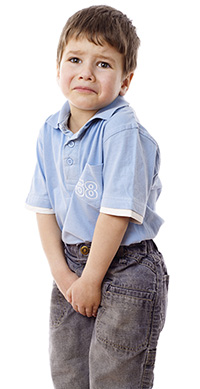Childhood Bedwetting (Enuresis) Treatment in Roanoke, TX

When a child accidentally leaks urine at night while they're sleeping, it is called enuresis—or more commonly, bedwetting. Children with this condition may have excessive urine production, poor sleep patterns and/or reduced bladder capacity. There are two types of enuresis:
- Primary nocturnal enuresis: This condition is often used to describe the inability to control urination during sleep, often referring to people who are old enough to be able to exercise urinary control.
- Secondary nocturnal enuresis: This is the involuntary passage of urine during sleep by a child that had been without any bedwetting for a period of at least six months.
Bedwetting is considered normal for kids under the age of five, but if your child is still wetting the bed at age six or seven, it's usually time to seek treatment. This is especially true if there is a sudden onset of bedwetting following a six-month, completely dry period. Although some cases of sudden bedwetting are caused by life changes, a doctor should also check your child for any underlying medical condition or illness.
The best way for parents to deal with a bed-wetter is to be supportive and reassuring, rather than blaming and punishing. The many treatment options range from home remedies to prescription medications, or even surgery for children with anatomical problems.
Causes of Enuresis
In most cases, bedwetting is usually an indication of the immaturity of the child's nervous system. Children who wet the bed typically do not recognize the sensation of the full bladder during sleep, and do not awaken to urinate. In very rare instances, bedwetting can be caused by type 1 diabetes or a congenital defect of the urinary tract. The most common causes for primary bedwetting include one—or a combination of—the following:
- The child physically cannot hold urine for the entire night
- The child does not or cannot wake up when his or her bladder is full
- The child produces a large amount of urine during the evening and night hours
- The child has poor daytime urination habits
Secondary bedwetting is thought to be caused by an underlying medical condition and/or emotional problems. A child with secondary bedwetting is much more likely to have other symptoms, like daytime wetting. The most common causes of secondary bedwetting include the following:
- Urinary tract infection
- Diabetes
- Neurological problems
- Emotional problems
- Sleep patterns
Bedwetting can also be genetic—many parents who wet the bed as a child often find their children have the same problem. Enuresis is typically seen more as a social disturbance than a medical condition.
Diagnosis & Treatment of Enuresis
To properly diagnose enuresis, your child will need a physical exam . Depending on the circumstances, your doctor may recommend urine tests, which check for signs of an infection or diabetes. He or she may also recommend X-rays if they suspect a structural problem with your child's urinary tract.
Your doctor can do several things to treat bedwetting, but it all depends on the underlying cause. If the patient history and physical exam do not suggest a specific medical problem and the urine tests are negative, several behavioral approaches can be used for treatment. Some of these approaches include:
- Intake management: Ensuring adequate but not excessive fluid intake during the day, a healthy diet, and avoiding caffeine-based drinks before bed.
- Positive imagery: Encouraging the child to imagine themselves dry, and even incentivizing with a reward system is often a helpful way to stop bedwetting.
- Bedwetting alarms: Planning times for your child to awaken and use the bathroom is a practical, short-term solution.
Enuresis can also be treated with medication—although this is not usually the first course of treatment, because no medicine has been proven to permanently cure bedwetting. However, medications like desmopressin and other tricyclic antidepressants can be helpful in increasing the amount of urine that the bladder can hold, or decreasing the amount of urine released by the kidney. Another popular approach is to use homepathic medicine like Equisetum or Belladonna to reduce urinary incontinence and any discomfort.
Request more information about childhood bedwetting today. Call (817) 203-2760 or contact The New You Medical & Infusion Clinic online.
The New You Medical & Infusion Clinic
Address
100 Grapevine HwyHurst, TX 76054
(817) 203-2760
https://www.newyoumedclinic.com/
Hours
Mon:
10:00 am - 6:00 pm
Tue:
10:00 am - 6:00 pm
Wed:
10:00 am - 6:00 pm
Thu:
10:00 am - 6:00 pm
Fri:
Closed
Sat:
Closed
Sun:
Closed

